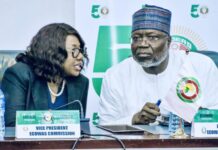By Oluwafunke Ishola
#TrackNigeria: Some industry experts have urged President Muhammadu Buhari to approach the issues of smuggling, infrastructure, unemployment and improving the business environment in his second term.
The experts stated this in separate interviews with the News Agency of Nigeria (NAN) in Lagos on Saturday.
They said that the president still had a huge task in tackling the issue of smuggling and infrastructure deficit which constituted an impediment to economic growth.
Mr Hamma Kwajaffa, Director-General of Nigerian Textile Manufacturers Association (NTMA) said that the challenge of smuggling and dumping of counterfeited goods was still rife in the country.
He noted that the issue had affected the capacity utilisation of the manufacturing sector, led to dearth and downsizing of some companies, while increasing the country’s unemployment rate.
Kwajaffa said that extant law should be made punitive to recognise smuggling as a criminal economic offence.
He also urged the president Buhari to ensure the effective implementation of the various Executive Orders, especially Executive Order 3, on patronage of locally-produced goods to boost productivity and growth.
Mr Eke Ubiji, Executive Secretary, Nigerian Association of Small and Medium Enterprises (NASME) urged the President Buhari to evolve policies and initiatives that would spur economic activities, job creation and infrastructure development.
He said that the government should ensure that there was no economic lull since the administration was continuing.
Mr Moses Imayi, Project Director, Skool Media, said that there was need to stimulate economic growth through increased investment in building the capacity of citizens to be globally competitive.
“With the growing trend of job losses and skills gap in the Nigerian labour market, government must be committed in ensuring this deficits are addressed and our labour market becomes more vibrant, adopting relevant skill sets that resonates with the twenty-first century,” he said.
Imayi said that education was pivotal to the growth of any economy, saying that government should not relent in boosting investment and relevant infrastructure that would catalyse socio-economic development.
He noted that the starting point to economic transformation was bridging the industrial skills gap, engaging technology and innovation to drive productivity. (NAN)



